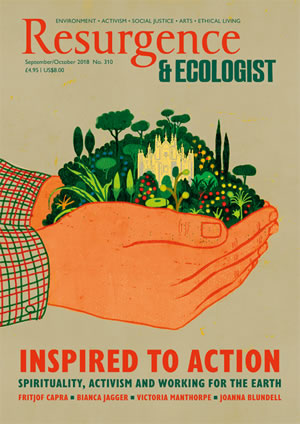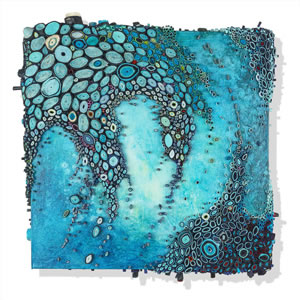“When we look at the world around us, we find that we are not thrown into chaos and randomness, but are part of a great order, a grand symphony of life.” Thus writes Fritjof Capra, the physicist and deep ecologist, in this issue of Resurgence & Ecologist. His essay – beginning on page 22 – is a striking argument for how modern discoveries in science are beginning to echo spiritual – though not necessarily religious – ideas about our place in the universe, and our connectedness with it.
The themes of connectedness and making meaning of our lives permeate this issue. As Capra argues, connectedness, relationship and interdependence are fundamental concepts of ecology; and connectedness, relationship and belonging are also the essence of religious experience. So it is a small step from being aware of our place in Nature to appreciating the importance of that relationship as well as our relationships with one another.
Of course, we must beware of drawing too explicit links with scientific theories most of us – if we are honest – can barely comprehend, with ideas that merge with the mystical. Capra’s ideas have their scientific critics as well as spiritually minded adherents. But when he writes, “we belong to the universe, and this experience of belonging can make our lives profoundly meaningful,” he is surely touching on something we have all felt at one time or another. It is this experience, perhaps, that explains the passion with which social, spiritual and environmental activists are imbued.
That is certainly true of some of the activists and idealists who contribute to this issue of Resurgence & Ecologist. Since the early 1980s, Bianca Jagger has increasingly devoted her formidable energies to human rights and, more recently, environmental campaigning. In this issue, she turns her attention to the problem of the pollution of our oceans by plastic waste.
Three women from a new generation of activists are profiled in Joanna Blundell’s article, Representing the People. Emily Penn’s passion for the oceans is also informing her campaign against pollution. Safia Qureshi is a young entrepreneur intent on combating our addiction to throwaway coffee cups. Hannah Steenbergen, meanwhile, is helping to develop the farm-based retreat centre that is 42 Acres.
Elsewhere, we interview the dramatist Jenna Watt about her one-woman show Faslane, which looks at the campaign against nuclear weapons. Thembi Mutch reports from Mozambique on environmental campaigners working with local coastal communities. And Victoria Manthorpe profiles three architects who have designed their own homes to meet the challenges of climate change.
Our arts and books pages are similarly enthused. Miriam Darlington’s short story on a visit to a solitary standing stone is as evocative as the megalith itself. Christine Toomey looks at the links between Buddhist and Stoic teachings on how to live well. Kate Blincoe spends a night beneath the stars. And Jini Reddy enjoys the magic connection between folk tales and healing.
It is fitting, then, though sad, that this issue also includes a tribute to Tessa Tennant, the campaigner for sustainable, green finance, and a long-time friend of Resurgence, who died earlier this summer, just a few weeks after she had received a lifetime achievement award for her work. In her acceptance speech, Tessa characteristically asserted that her successes had only been possible because of the support of others. In a word, our connectedness.
“Progress takes teamwork, so it’s not just me,” Tessa said. “Here’s to acknowledging many more people unfrightened of challenging the status quo and dedicated to making a better world.”








